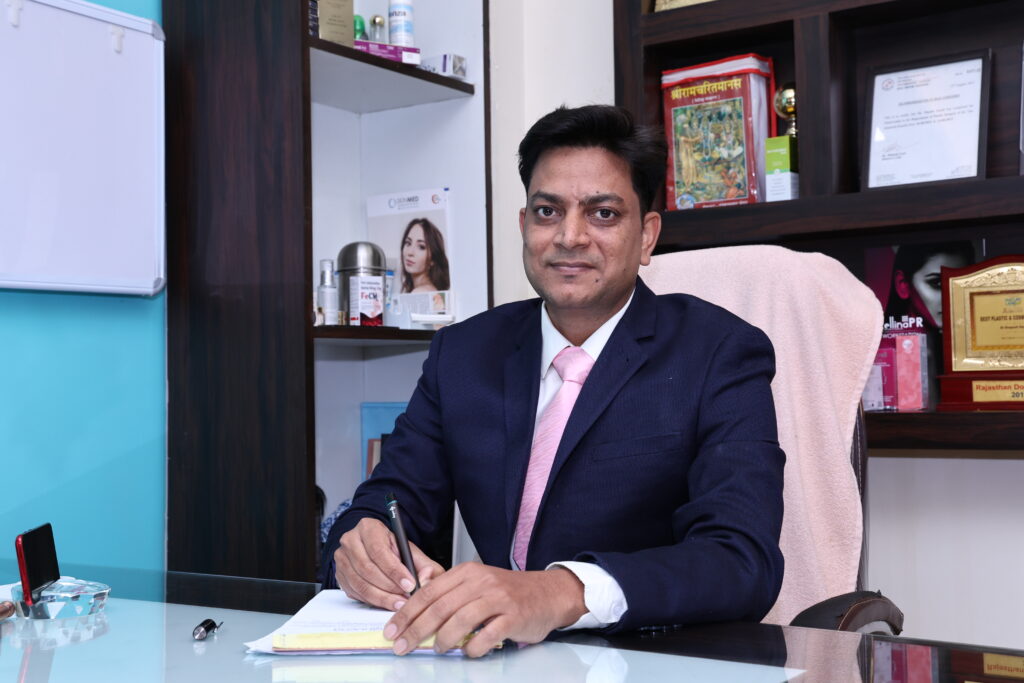Liposuction is a popular cosmetic surgery that helps remove excess fat deposits from various body areas, resulting in a more contoured appearance. While it offers significant results, it is essential to understand that swelling and bruising are expected side effects after the surgery. However, it is unusual for swelling to persist for several months.
If you are experiencing prolonged swelling after liposuction, it is advisable to consult a reputable plastic surgeon like Dr Deepesh Goyal, who specializes in liposuction procedures.
Dr Deepesh Goyal offers safe and result-oriented liposuction surgery at Rejuvena Cosmo Care, a renowned plastic surgery clinic in Jaipur. He is a highly-qualified and skilled plastic surgeon in Jaipur who can assess your condition, provide appropriate guidance, and ensure you achieve optimal liposuction before and after results.
If you are considering liposuction in Jaipur, Dr Goyal’s expertise and experience can guide you through the liposuction process, addressing the concern of swelling four months after liposuction and providing valuable insights into the procedure, liposuction cost, and expected outcomes.
This article will provide an overview of the causes of swelling after liposuction, when to be concerned about it, treatment options, tips to reduce swelling, and more.
First, let’s know,
What Can Be the Causes of Swelling?
Swelling after liposuction is a common occurrence. However, swelling four months after liposuction can occur due to various factors. Here are some common causes:
- Inflammation: The body’s natural response to surgery is inflammation, which can lead to swelling. Even though it subsides gradually, some residual swelling may persist for several months.
- Lymphatic System Disruption: Liposuction disrupts the lymphatic system, which plays a crucial role in fluid drainage. The compromised lymphatic flow can contribute to swelling in the treated areas.
- Fluid Retention: Fluid accumulation in the body tissues can occur after liposuction. This can be attributed to the healing process and the redistribution of fluids in the body.
- Scar Tissue Formation: The formation of scar tissue during the healing process can contribute to swelling. As the body repairs itself, scar tissue can lead to fluid retention and swelling in the treated areas.
- Activity Level: Doing strenuous physical activities or not following post-operative instructions can exacerbate swelling. Following the surgeon’s instructions is essential to minimize swelling and aid healing.
When Should You Be Concerned About Swelling?
- Swelling is a normal part of the healing process after liposuction surgery. However, there are certain situations where you should be concerned and consult your doctor.
- If the swelling worsens or persists beyond the expected recovery period, or if it is accompanied by severe pain, redness, excessive bruising, or a noticeable increase in size, it is crucial to seek medical attention.
- Additionally, if you experience symptoms such as fever, chills, or any signs of infection, you must consult your doctor promptly.
- If you experience any of the concerning symptoms mentioned above or have any other concerns about the swelling, it is advisable to consult your doctor.
- They will be able to evaluate your condition, assess the severity of the swelling, and recommend any necessary treatments or interventions to ensure a safe and successful recovery from liposuction surgery.
Now, let’s discuss,
Treatments to Follow for Swelling
If you are experiencing swelling four months after liposuction surgery, your doctor may recommend the following treatments to help alleviate and manage the swelling:

1. Compression Garments: Wearing compression garments as instructed can help reduce swelling and promote proper healing.
2. Lymphatic Drainage Massage: This specialized massage technique can help stimulate lymphatic circulation, accelerate healing, and decrease swelling.
3. Elevation: Elevating the treated area above the heart level can help minimize swelling.
4. Cold Therapy: Applying cold packs to swollen areas can help reduce inflammation and alleviate discomfort.
5. Medications: Your doctor may prescribe anti-inflammatory drugs or diuretics to manage swelling.
It is essential to consult with your plastic surgeon for personalized advice and guidance on the most suitable treatments for your specific situation.
Additional Tips to Reduce Swelling
In addition to medical treatments, you can follow these tips to reduce swelling after liposuction:
- Follow a Healthy Diet: Eating a balanced diet rich in fruits, vegetables, and lean proteins can promote healing and reduce inflammation.
- Stay Hydrated: Drinking plenty of water can help flush out excess fluids from your body.
- Avoid Salt: Limiting salt intake can prevent water retention and further swelling.
- Avoid Alcohol and Tobacco: These substances can impair healing and contribute to prolonged swelling.
- Gentle Exercise: As your doctor recommends, engaging in light physical activity can improve blood circulation and reduce swelling.
Swelling after liposuction is a normal part of the healing process. But monitoring its progression and awareness of any concerning symptoms is essential. Most swelling resolves within a few weeks to months after the procedure, but individual healing times may vary.
Following your doctor’s advice, undergoing recommended treatments, and adopting healthy habits can minimize swelling and promote a smoother recovery.
Frequently Asked Questions
Q: How long does swelling after liposuction last?
A: Swelling after liposuction can persist for several weeks to months. Most swelling typically resolves within the first three to four months. But complete resolution may sometimes take up to six months or more.
Q: What can be the symptoms of swelling after liposuction?
A: Swelling after liposuction is characterized by puffiness, tightness, and an increased volume in the treated areas. It may also be accompanied by mild discomfort or tenderness.
Q: Does exercise increase swelling after lipo?
A: Intense or excessive exercise immediately after liposuction can increase swelling. Gentle exercise, as recommended, can aid in reducing swelling by promoting blood circulation. However, your doctor will provide guidelines on when it is safe to resume physical activity.
Q: How long does it take to heal from liposuction completely?
A: Complete healing after liposuction can vary depending on individual factors, the extent of the procedure, and the treated areas. Generally, it can take several months for the body to heal completely and for the final results to become apparent. Your doctor will provide a more accurate estimate based on your specific case.

